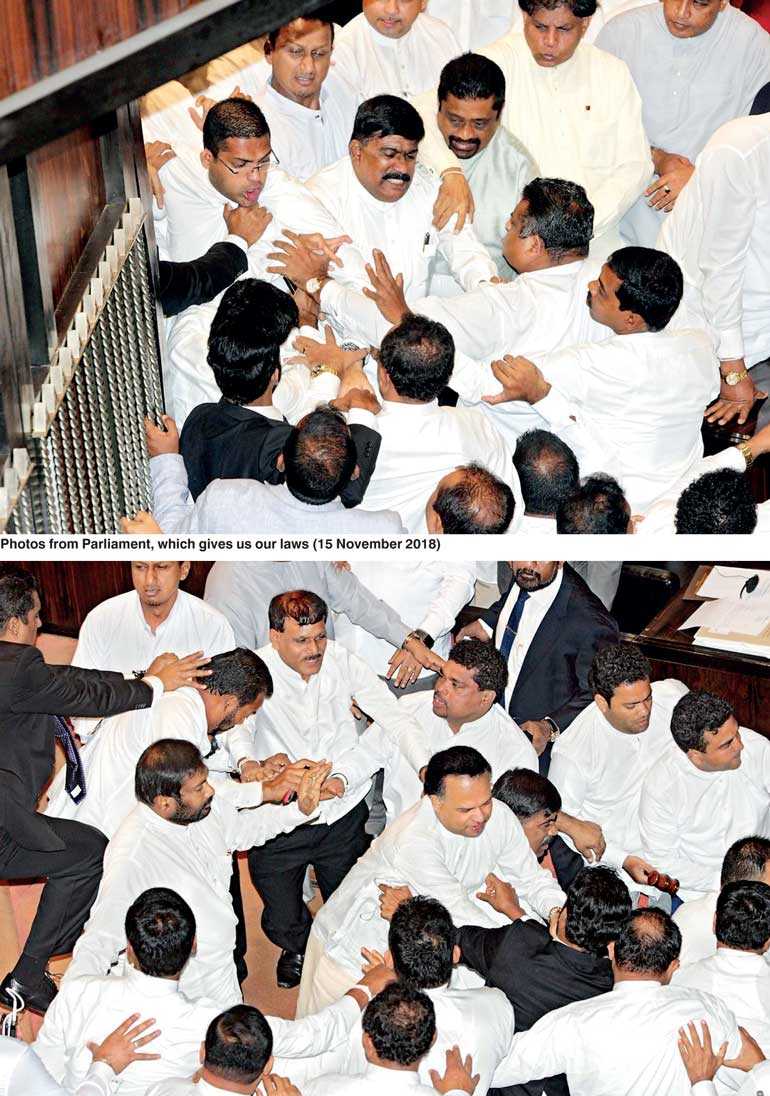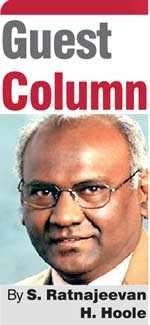Wednesday Feb 18, 2026
Wednesday Feb 18, 2026
Monday, 19 November 2018 00:10 - - {{hitsCtrl.values.hits}}

 I am under criticism for “taking sides” in the ongoing dispute between the UNF and UPFA. Former President Mahinda Rajapaksa has accused me thus:
I am under criticism for “taking sides” in the ongoing dispute between the UNF and UPFA. Former President Mahinda Rajapaksa has accused me thus:
“Yesterday a commissioner from the Elections Commission went to the Supreme Court saying that the President’s decision to dissolve Parliament is against the law. He has gone before the Supreme Court although more than 10 others have also filed cases and his actions will contribute to the promotion or the demotion of a party. It is unethical for a member of the Elections Commission to do so. So why did he do it? Ratnajeevan Hoole is the Tamil National Alliance (TNA) nomination for the Elections Commission and he has shown his political bias," Rajapaksa said (The Island, 13 November 2018).”
I do not wish a point-by-point rebuttal of this statement’s numerous errors of fact and judgment, starting with the fact that we have no Election Commissioners. I objected not to elections per se, but to illegal elections and being forced to conduct them in violation of my rights.
On 15 November there were two more missives against me. One was in the Divaina Editorial. I cannot read it, but the person who read it and told me of it, said that the communalist newspaper had only two accurate facts – my father’s name and my brother’s.
The other missive was by my friend C.A. Chandraprema, who carefully weaves facts with calculated untruths (The Island, 15 November 2018). He says I never challenged the postponement of Local Government Elections. Yes, true. What is untrue is the claim that in going to court, I joined “the very same political parties, the UNP, the TNA, the JVP and two Muslim political parties that colluded with one another to change the Local Government Elections …”
The fact that Chandraprema left out the SLFP shows his bias and attempt at mind-manipulation. He would do well to remember that the Minister responsible for Local Government Elections and their postponement was Faiszer Musthapha of the SLFP. If he had read what I have written (for example, “Are we a Democracy? Maybe?” The Island, 7 June 2018) he would have known that I have raised many of these points in favour of the law. I did not go to court on the postponement of elections because there was already a judgment. Importantly, in postponing elections as described by Chandraprema, there was brazen manipulation but nothing unlawful to challenge.
Spin
There is a reason why I do not go into a detailed criticism. I was awarded India’s IETE Gowri Gold Medal for my work, showing that ethics is rarely implemented as an absolute standard. I have shown that many spin good principles for narrow purposes (vide my recent book ‘Ethics for Professionals: An Internationalist, Human Rights Perspective’, Cognella Press, San Diego, CA, 2008). Besides my main subject of electrical engineering, I also teach professional ethics, a compulsory subject for accredited engineers.
We know from established research that people decide and vote by identity. So whatever a politician says, it will be swallowed whole by loyal supporters who share his ethnicity and party. We therefore really cannot learn anything from the pontifications of politicians and their mouthpieces. We must cultivate reading laws for ourselves and deciding for ourselves.
We have seen a lot of spinning in a cafeteria reading of the Constitution, rather than as a whole document. We have seen the high principle of neutrality being misused for narrow ends, spinning (as in Mahinda Rajapaksa’s piece in the Island) that the Elections Commission, to be neutral, must not have an opinion on the law and not go to court. How can we not have an opinion when we are charged by the Constitution in Article 104B (2) “to secure the enforcement of all laws relating to the holding of any such election or the conduct of referenda”? Without an opinion on the law, how is it possible to secure the enforcement of laws?
Indeed, the Supreme Court gave an interim order on the dissolution of Parliament that went against the President’s position. Does it mean that the Supreme Court is biased and “politically motivated”? Of course that opinion contributed to the promotion of one party and the demotion of another. However, in rendering that judgment, the Supreme Court did its work.
More spin is coming that a referendum must decide who the Prime Minister is. Law and tradition are clear that an elected Government has a mandate for a period. Without that security, no Government will implement bold policy, even when such policy is unpopular in the short term but has long-term dividends. Besides, after an expensive referendum, there is no law to change Governments based on the result. It would lead only to more conflict and no resolution – another spin for the faithful. To not be victims of spin, we need sound civic education in our schools. We are an independent Commission and nobody’s mouthpiece. When we rule on matters, we necessarily promote the right side. It is called doing our work.
The law
Public confidence in the law is at a low point today. In the North, the police can be easily bought – in two instances when the Election Commission filed complaints, the police filed the unrelated charge of campaigning at a polling both, instead of the far more serious and correct charge that the election campaign was launched from a temple. The judge revealed his political bias openly, acting against a person on whom notice was not served. Complaints to the Judicial Services Commission went unheeded despite several reminders. However, with the new CJ, the complaint has moved to inquiry.
In Jaffna, where the Commission complained against a lawyer threatening an Election Commission Member, the system showed open bias. Again a reduced charge was filed, and it took several letters to the IGP and the AG to get the charge corrected. Nonetheless, the bias for a fellow lawyer was evident. The magistrate sent the matter for mediation when the law did not allow it for such a serious matter against society. The Acting Magistrate, V.T. Sivalingam, showed open bias for the accused by letting him wear his cloak and stand outside the cage for the accused, and got very angry when asked if the accused had special privileges.
Indeed, from the time of a) the disfranchisement of hill-country Tamils, b) to the Kodeeswaran case, c) to the Bindunuwewa Massacre where the Supreme Court berated a 12-year old murdered Tamil boy as a terrorist, d) to Chief Justice Sarath Silva boasting of his special favours in the Hambantota judgment, e) to CJ Mohan Peiris’ stooging, the reputation of our highest judges has been taking a beating – until now, that is. The new Chief Justice and his two colleagues have redeemed our judiciary, at a time when the Election Commission felt the judgment would go against us if we challenged the dissolution of Parliament. I have seen colleagues fearing to go to court expecting – nay, being sure of – a judgment favouring those in authority. Now we can do the right thing with decent hope of correct judgments.
However, there will be bumps on the road like on 15 November. Can the thugs who rioted in Parliament ever be capable of reading and understanding laws? Writing good laws? Will Parliamentary privilege be used to shield them from prosecution – just like some judges hide behind contempt to be tyrants in court?
The Maldivian comparison
A Foreign Affairs Secretary demanded that I not go as an observer for the Maldivian elections, saying “We are a 5-star democracy. We cannot be associated with the Maldives.” Are we truly a 5-star democracy? The Maldives looks better after the recent democratic change of governments. I cry for my country.
We need to be biased, always – for the law. There can be no neutrality.